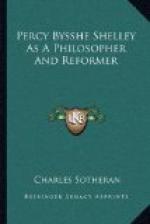Make as a two-edged sword to all who wield,—
Golden and sanguine laws which tempt and slay—
Religion Christless, Godless, a book sealed,—
A Senate—time’s worst statute unrepealed,—
Are graves from which a glorious phantom may
Burst to illumine our tempestuous day?”
To aid Republicanism, he threw himself with fervor into the cause of the unhappy Caroline of Brunswick; and on her account he wrote “God Save the Queen,” in imitation of the British national anthem, and the satirical piece entitled “Swellfoot, the Tyrant.” In the following words he attacked the prime minister, Lord Castleragh, whose reactionary counsels were transforming England into a state analogous to that of Russia to-day:
“Then
trample and dance, thou oppressor,
For
thy victim is no redressor!
Thou
art sole lord and possessor
Of her corpses, and clods
and abortions—they pave
Thy
path to a grave.”
For the Lord Chancellor, Eldon, his hatred was intense; for, in addition to the crime of robbing him of his children, this occupant of the wool-sack, had made the seat of justice an appanage for his lust of wealth and power. I have already quoted some verses on this renowned lawyer, and will now present you with two others bearing on the same subject:
“Next came Fraud, and he had
on,
Like Lord Eldon, an ermine
gown;
His big tears (for he wept
well)
Turned to mill stones as they
fell;
“And the little children,
who
Round his feet played to and
fro,
Thinking every tear a gem,
Had their brains knocked out
by them.”
In Queen Mab, Shelley has presented us with an unmistakable portraiture of the “First Gentleman in Europe;” and in the following lines, which I have taken from this poem, I have chosen two extracts, descriptive of the origin of political despotism, and the reason of its continuance:
“Whence, thinkest thou, kings
and parasites arose?
Whence that unnatural line
of drones, who heap
Toil and unvanquishable penury
On those who build their palaces,
and bring
Their daily bread? From
vice, black, loathsome vice,
From rapine, madness, treachery
and wrong;
From all that genders misery,
and makes
Of earth this thorny wilderness;
from lust,
Revenge and murder.”
* * * * *
“Nature rejects the monarch,
not the man;
The subject, not the citizen;
for kings
And subjects, mutual foes,
forever play
A losing game into each other’s
hands,
Whose stakes are vice and
misery. The man
Of virtuous soul commands
not nor obeys.
Power, like a desolating pestilence,
Pollutes whate’er it
touches; and obedience,
Bane of all genius, virtue,
freedom, truth,
Makes slaves of men, and of
the human frame
A mechanized automaton.”




